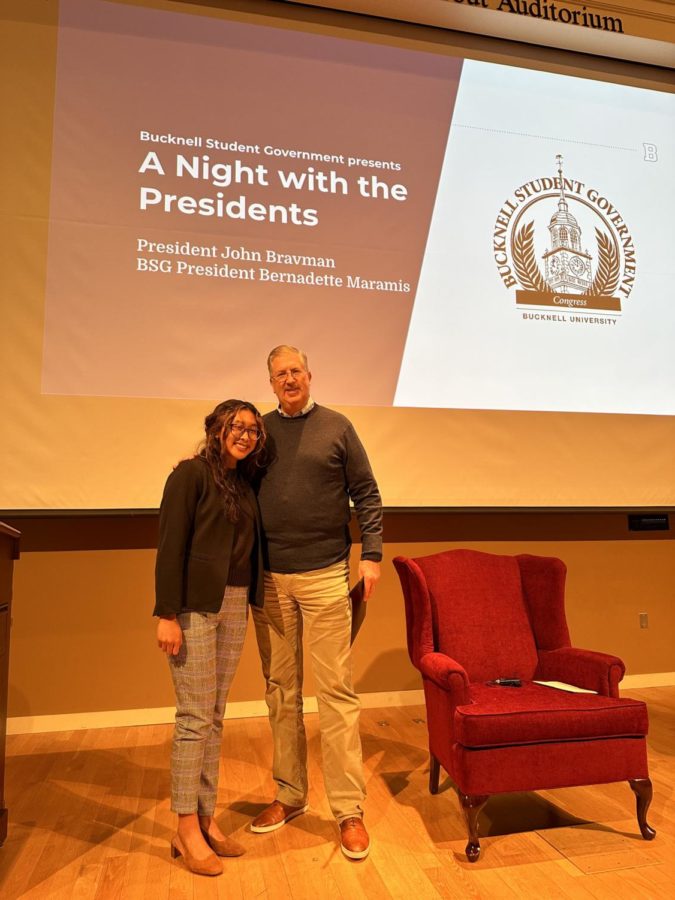Bravman answers questions from BSG President in Trout Auditorium
November 4, 2022
President John Bravman spoke with Bucknell Student Government President Bernadette Maramis ’24 for the annual “A Night with the Presidents” event in Trout Auditorium on Nov. 1.
The conversation began with brief remarks from Maramis and Bravman, transitioned to pre-questions and concluded with a live Q&A session, where students in attendance were able to pose their own queries to President Bravman.
A plethora of topics were covered throughout the discussion, including questions regarding diversity, equity and inclusion, the University’s goals for sustainability, the importance of the MyVoice survey and the ways in which the University provides academic support.
The speakers also talked about whether Bucknell would transition into a research institution, the infamous issue of parking on campus, future plans for lower campus, next year’s culmination of Parents Weekend and Homecoming and President Bravman’s own vision of what the Bucknell student experience should look like.
Maramis began the pre-submitted questions by inquiring about the University’s commitment to be carbon neutral by 2030; President Bravman said that he was very proud that the University had been named No. 40 in the Princeton Review’s Top 50 Green Schools and reiterated that he felt extremely accomplished that it had become a reality.
“Every building built on campus since 2010 is ranked as LEED silver or better,” Bravman said, alluding to the universal system used to determine the sustainability of buildings.
Leadership in Energy and Environmental Design (LEED) is the system by which Bucknell buildings are ranked in sustainability.
President Bravman also stressed the importance of students participating in and taking the MyVoice survey, and explained how difficult it is for the Board of Trustees, faculty, staff and administration to understand “where students are at in their thinking and actions.”
Bravman also explained that in years past, the survey has had a return rate of almost 60 percent, while this year’s response rate is resting at approximately half of that. Dean Badal also chimed in to enhance the importance of taking the survey and reminded students that there are a multitude of prizes available to be raffled away to students who participate.
President Bravman spoke briefly on the notorious issue of parking permits, and delineated the issue as one that is found at almost every college campus in the country. Bravman also said that “[He] will ask you to consider… not to drive to class.”
He said that almost no university allows for first-years to have cars on campus and that they will not convert land into more parking lots in order to uphold their carbon neutrality promise.
Maramis also asked President Bravman about future plans for the University, including a lower campus, specifically, as well as whether administrators were considering shifting into a research institution. Bravman immediately responded that no, there are not and will not be any plans to convert Bucknell into a research University.
He did outline some of the architectural shortcomings of the University, and said that there isn’t a real “front door” of campus.
“We will never develop the front lawn as long as long [he’s] here,” Bravman said.
He said despite how beautiful the university is widely regarded, it suffers from some architectural flaws. He said the historic Seventh Street House will never be touched, but that the Seventh Street Cafe needs some renovation, in addition to the Botany Building.
Bravman said that the University has hired two architectural firms in order to advise administrators on what to do with the wide open space and with buildings that may need some form of renovation or makeover.
In addition, Maramis posed a question to President Bravman regarding the university’s DE&I policies and strides that have been made in recent years to facilitate more conscious efforts in improving and increasing diversity.
Bravman shared an anecdotal comment detailing the changes he has seen in his own administration, describing the difference between when he had only white male administrators reporting to him when he arrived in 2010 versus nowadays only having one white male reporting to him.
He also discussed the imperative responsibility of the University to seek a new employee on the VP level after the departure of Nikki Young, who helped make great strides in the university’s commitment to improve diversity, equity and inclusion.
Students additionally expressed dissent with the prospected combination of Parents Weekend and Homecoming for the Fall 2023 semester, to which Bravman said that despite next year being a “pilot” of sorts to test the functionality of combining both events, he said he “doubts it will return to how it was.”
He indicated that the attendance for Homecoming Weekend has declined in recent years and that the events funded and put on for the occasion have been poorly attended, which fostered the original motivation for the culmination of both occasions on the same weekend. Bravman said he hopes this change will help the university’s interest in “conserving resources.”
The event concluded the pre-submitted questions with Bravman detailing his hopes for what the ideal student experience at Bucknell would entail; the first thing he stressed was to enjoy time at Bucknell because it goes by very quickly, echoing the sentiments of other long-heard aphorisms regarding college years.
He also drew from his own first-generation college funding experience, explaining that most of his education from Stanford University was paid for in loans, scholarships and part-time jobs.
“I want everyone who is admitted to Bucknell to be able to afford Bucknell,” Bravman said.




















